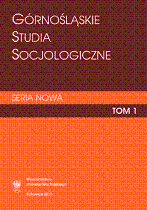Symbol, czas, struktura. Fundamentalizm religijny jako odpowiedź na globalizację
Symbol, time and structure. Religious fundamentalism as a response to globalization
Author(s): Tomasz WarczokSubject(s): Social Sciences
Published by: Wydawnictwo Uniwersytetu Śląskiego
Keywords: fundamentalism; globalization; liminality; structure; symbolic processes; time
Summary/Abstract: The article is an attempt to explain the phenomenon of religious fundamentalism that is perceived as a manifestation of globalization. The author shows that the key motive of the fundamentalism that is analysed here solely in the American, protestant version, is the reconstruction of the symbolic order that was violated by global detraditionalization and relativisation. The undermining of cultural norms and rules that have — until now — been taken for granted, calls into question the obviousness of “being-in-the-world”. It violates the sense of ontological security and, as a result, causes anxiety. The author sees that process as Victor Turner’s liminality, where the symbolic structure was scattered, identities were blurred and the temporal order was disrupted. Liminality turns into structure and the latter is reconstructed in a dichotomous mode, as Durkheim, Lévi-Strauss and Mary Douglas showed. Such an effect is clearly visible in multidimensional representations and discourses of the religious fundamentalism, for example in the opposition of “Us” versus “Them”. A sense of security is also rebuilt through a ritual reconstruction of the symbolic, temporal order that is present on the individual (biographical) as well as the collective levels.
Journal: Górnośląskie Studia Socjologiczne. Seria Nowa
- Issue Year: 2010
- Issue No: 1
- Page Range: 117-132
- Page Count: 16
- Language: Polish

